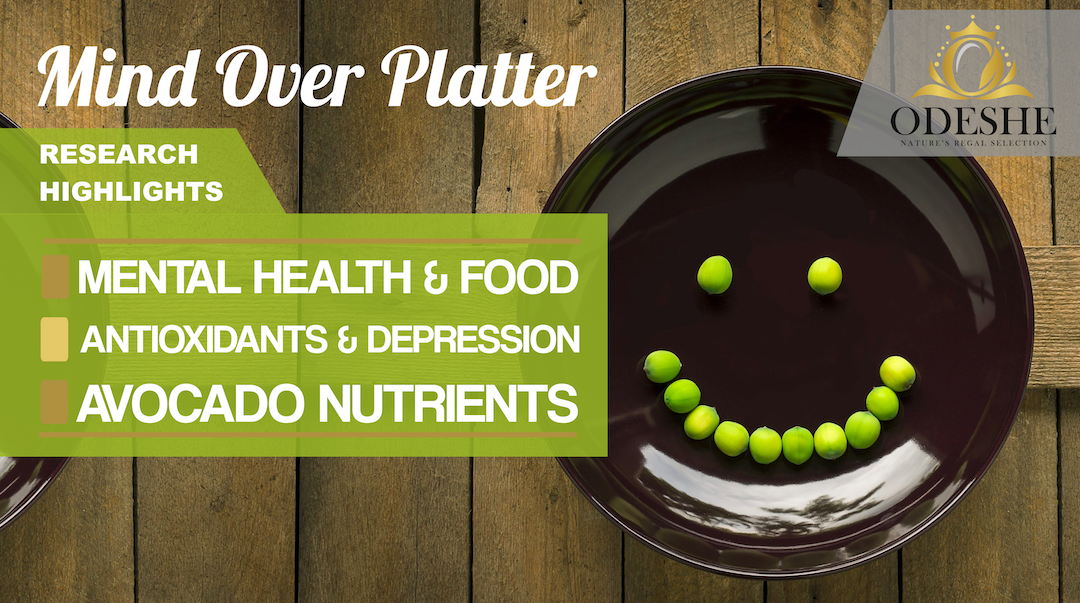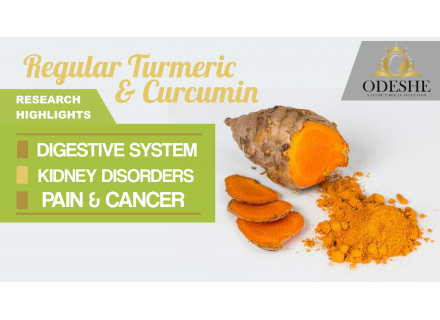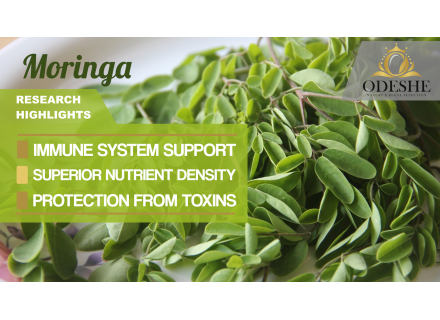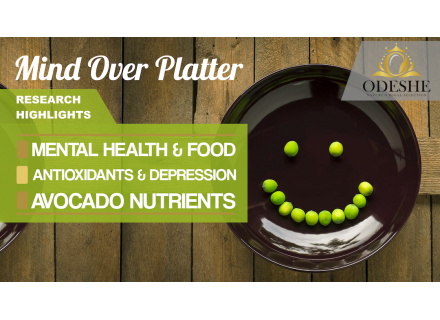Mind Over Platter: Mentally Healthy Meals

Throughout the hustle and bustle of life, from education to employment and finding a personal life in the mix, life asks us constantly what we prioritise. Even if we remember to improve our physical health, mental health may often be at the back of our minds at best. Obviously many already interface directly with mental health issues, personally or with a loved one, on a day-to-day basis. Physical exercise and meditation are among many accessible approaches to boost mental health and elevate mood [1]. But the evidence is also clear that what we eat plays a strong role in our emotions, mental health and other brain related health issues.
Protect the Children. The quality of the food we eat impacts us in full force from as early on as our childhoods. Persistently poor diet choices, such as opting for classic “fast foods”, result in poor mental health scores in 14-year olds (testing for withdrawal, anxiety, depression and more in the 1,860 teenagers studied) [1]. But surprisingly, eating meat was the most damaging food choice as far as to the mental health of these teenagers [1]. Although not as harmful as a drug habit is to mental health [1], the diet of our young people is relatively easier to control.
Similar observations were made of over 5,000 Chinese 11–16 year-olds [2]. Scientists found that higher intakes of high-calorie/preserved snacks or meat were each associated with higher rates of anxiety and depression [2]. Far from “cherry-picking” these studies, a review of several diet and mental health studies clearly shows that good diet choices are statistically linked to protecting the mental health of children and teens [3].
But why?
Beware of the Inflammatory Diet. The gut-brain axis, which is the part of the nervous system that links the two organs, is thought to be sensitive to inflammatory signals in large part through microbes in the gut [4]. This sensitivity actually contributes in many ways to anxiety and depression [4]. An omnivorous diet is more likely to have high levels of pro-inflammatory compounds such as arachidonic acid [5] and bacterial endotoxins [6]. The current research shows that the plant-based diet is the best for maintaining a healthy, anti-inflammatory gut microbe profile.
Plant food juice; great for the mind (Photo: Pixabay / Couleur)
A different study measured antioxidant levels in participants and linked antioxidant status directly with depression [7]. The more antioxidants people had circulating in their bloodstreams, the lower their occurrence of depression [7]. Rather than bathing our insides in the anti-inflammatory antioxidants that are abundant in a high vegetable/plant-based diet [8], omnivorous foods have been shown to worsen mood states in physically healthy people [5]. Despite the promise of improving brain function with omega-3 fatty acids from regular fish consumption, a vegetarian diet has also been shown to be better for mental health [5].
Accumulating Environmental Pollutants. Often at the top of the food chain, humans run the risk of eating environmental pollutants that have consumed by the lower-level food chain members. It is worth investing in the book “How Not to Die” [9] so you can look at the chapter on Parkinson’s disease and get an idea of how a plant-based diet helps us avoid aggregating persistent environmental pollutants accumulated frequently consumed animal products [10].
Hark, Antioxidants Abound! It appears that high-antioxidant diets are beneficial to mental health [7]. The study of 14-year olds mentioned earlier demonstrated that the group of teenagers with the highest vegetable intake generally had better mental health scores [1]. Chinese teenagers with the highest rates of a traditional diet, which happens to be high in antioxidant rich plant foods, showed the lowest rates of mental health issues amongst the youngsters surveyed [2]. The same is the case for young adults; 18–25 year-olds who had a “fruit and veg intervention” experienced greater psychological well-being and motivation compared to those kept on a standard omnivorous diet [11].
Amongst the elderly, frequent curry consumers have higher cognitive function scores, and the spice turmeric may be solely responsible [12]. Turmeric contains the powerful anti-inflammatory antioxidant curcumin, which has potent activity against Alzheimer’s progression [12].
Avocado Aficionado. “Avocado is a rich source of the pigment lutein that our bodies concentrate in the macular pigments of our brains [13]. Regularly eating avocados for 6 months elevated circulating levels of lutein in the bloodstream, and boosted lutein content of the macular pigment, whilst memory, attention and problem solving actually improved [13].”
Antioxidants Against Alzheimer’s Disease. As far back 2006, The Kame Project found that drinking fruit and vegetable juices 3 times a week lowered the risk of Alzheimer’s disease by over 75% [14]! This powerful level of protection has been attributed to the thousands of various “polyphenols”, a class of antioxidants found abundantly in plant foods [10]. A more recent review of multiple studies highlight the power of fruit, vegetables and 100% juice to improve the cognitive power of consumers [15]. The power of plant food-juice is full of surprises for researchers: one glass of 100% purple grape juice has been shown to improve mood and cognition in adults after just 25 minutes [16].
Recent
research shows that the brains of deceased Alzheimer’s patients tend to
have much higher levels of herpes virus (non-STD variants) and other
viruses than the brains of those who passed away without Alzheimer’s
disease [17].
More than just lingering in the brain, this comprehensive analysis of
brain matter revealed that the virus contributed to the development of
Alzheimer’s by changing gene expression in the brain [17].
Much of the science is still being pieced together, but if viruses are a true contributing factor to Alzheimer’s disease development/progression (or even just an indicator of antioxidant status), what people eat and drink may be their best protection from developing the disease. Antioxidants from foods such as grapes, berries, peanuts, and almonds empower the body to combat the prevalence and multiplying of invading viruses [18, 19, 20]. Lowered antioxidant capacity within the body is linked with lowered cognitive health/ability [7, 21].
Many contaminants and pollutants that increase the risk of Alzheimer’s disease concentrate in the bodies of fish and animals, meaning that an omnivorous diet may increase exposure to chemicals that promote Alzheimer’s disease [22].
A Practical Mindset. If the evidence supporting going 100% plant-based sounds like too far of a jump to make for the sake of mental health, hopefully tips like 100% fruit/veg juice and avocados are still useful. Some of the latest studies show that raw fruit and vegetables are better for mental health than those processed [23]. But the research shows that going vegetarian may be enough for some people: healthy subjects who transitioned from an omnivorous diet to vegetarian food experienced an improvement in mood after just 2 weeks [5].
Disclaimer: If you have medical concerns, please consult your doctor before implementing the opinions in this article.
(References)
1. Robinson, M., Kendall, G. E., Jacoby, P., Hands, B., Beilin, L. J., Silburn, S. R., Zubrick, S. R. and Oddy, W. H. (2011) Lifestyle and demographic correlates of poor mental health in early adolescence. Journal of Paediatrics and Child Health. 47, 54–61
2. Weng, T.-T., Hao, J.-H., Qian, Q.-W., Cao, H., Fu, J.-L., Sun, Y., Huang, L. and Tao, F.-B. (2012) Is there any relationship between dietary patterns and depression and anxiety in Chinese adolescents? Public Health Nutrition. 15, 673–682
3. O’Neil, A., Quirk, S. E., Housden, S., Brennan, S. L., Williams, L. J., Pasco, J. A., Berk, M. and Jacka, F. N. (2014) Relationship Between Diet and Mental Health in Children and Adolescents: A Systematic Review. American Journal of Public Health. 104, E31-E42
4. Foster, J. and Neufeld, K. A. (2014) Gut-brain axis: How the microbiome influences anxiety and depression. International Journal of Neuropsychopharmacology. 17, 27–27
5. Beezhold, B. L. and Johnston, C. S. (2012) Restriction of meat, fish, and poultry in omnivores improves mood: A pilot randomized controlled trial. Nutrition Journal. 11
6. Erridge, C. (2011) The capacity of foodstuffs to induce innate immune activation of human monocytes in vitro is dependent on food content of stimulants of Toll-like receptors 2 and 4. British Journal of Nutrition. 105, 15–23
7. Black, C. N., Penninx, B. W. J. H., Bot, M., Odegaard, A. O., Gross, M. D., Matthews, K. A. and Jacobs, D. R., Jr. (2016) Oxidative stress, anti-oxidants and the cross-sectional and longitudinal association with depressive symptoms: results from the CARDIA study. Translational Psychiatry. 6
8. Pellegrini, N., Serafini, M., Colombi, B., Del Rio, D., Salvatore, S., Bianchi, M. and Brighenti, F. (2003) Total antioxidant capacity of plant foods, beverages and oils consumed in Italy assessed by three different in vitro assays. Journal of Nutrition. 133, 2812–2819
9. Greger, M. and Stone, G. (2015) How Not To Die. Flatiron Books
10. Murphy, T., Dias, G. P. and Thuret, S. (2014) Effects of diet on brain plasticity in animal and human studies: mind the gap. Neural plasticity. 2014, 563160–563160
11. Conner, T. S., Brookie, K. L., Carr, A. C., Mainvil, L. A. and Vissers, M. C. M. (2017) Let them eat fruit! The effect of fruit and vegetable consumption on psychological well-being in young adults: A randomized controlled trial. Plos One. 12
12. Ng, T.-P., Chiam, P.-C., Lee, T., Chua, H.-C., Lim, L. and Kua, E.-H. (2006) Curry consumption and cognitive function in the elderly. American Journal of Epidemiology. 164, 898–906
13. Scott, T. M., Rasmussen, H. M., Chen, O. and Johnson, E. J. (2017) Avocado Consumption Increases Macular Pigment Density in Older Adults: A Randomized, Controlled Trial. Nutrients. 9
14. Dai, Q., Borenstein, A. R., Wu, Y., Jackson, J. C. and Larson, E. B. (2006) Fruit and vegetable juices and Alzheimer’s disease: The Kame Project. American Journal of Medicine. 119, 751–759
15. Lamport, D. J., Saunders, C., Butler, L. T. and Spencer, J. P. E. (2014) Fruits, vegetables, 100% juices, and cognitive function. Nutrition Reviews. 72, 774–789
16. Haskell-Ramsay, C. F., Stuart, R. C., Okello, E. J. and Watson, A. W. (2017) Cognitive and mood improvements following acute supplementation with purple grape juice in healthy young adults. European Journal of Nutrition. 56, 2621–2631
17. Readhead, B et al. (2018) Multiscale Analysis of Independent Alzheimer’s Cohorts Finds Disruption of Molecular, Genetic, and Clinical Networks by Human Herpesvirus. Neuron 99, 1–19
18. Chan, C. N., Trinite, B. and Levy, D. N. (2017) Potent Inhibition of HIV-1 Replication in Resting CD4 T Cells by Resveratrol and Pterostilbene. Antimicrobial Agents and Chemotherapy. 61
19. Yang, T., Li, S., Zhang, X., Pang, X., Lin, Q. and Cao, J. (2015) Resveratrol, sirtuins, and viruses. Reviews in Medical Virology. 25, 431–445
20. Meyer, M. and Jaspers, I. (2015) Respiratory protease/antiprotease balance determines susceptibility to viral infection and can be modified by nutritional antioxidants. American Journal of Physiology-Lung Cellular and Molecular Physiology. 308, L1189-L1201
21. Khazan PhD, M., Hedayati PhD, M., Robati Md, R. M., Riahi PhD, S. M. and Nasiri, S. (2018) Impaired oxidative status as a potential predictor in clinical manifestations of herpes zoster. Journal of medical virology
22. Athanasopoulos, D., Karagiannis, G. and Tsolaki, M. (2016) Recent Findings in Alzheimer Disease and Nutrition Focusing on Epigenetics. Advances in Nutrition. 7, 917–927
23. Brookie, K. L., Best, G. I. and Conner, T. S. (2018) Intake of Raw Fruits and Vegetables Is Associated With Better Mental Health Than Intake of Processed Fruits and Vegetables. Frontiers in Psychology. 9


%203pp_FP200ML_perspective-200x200.png)


